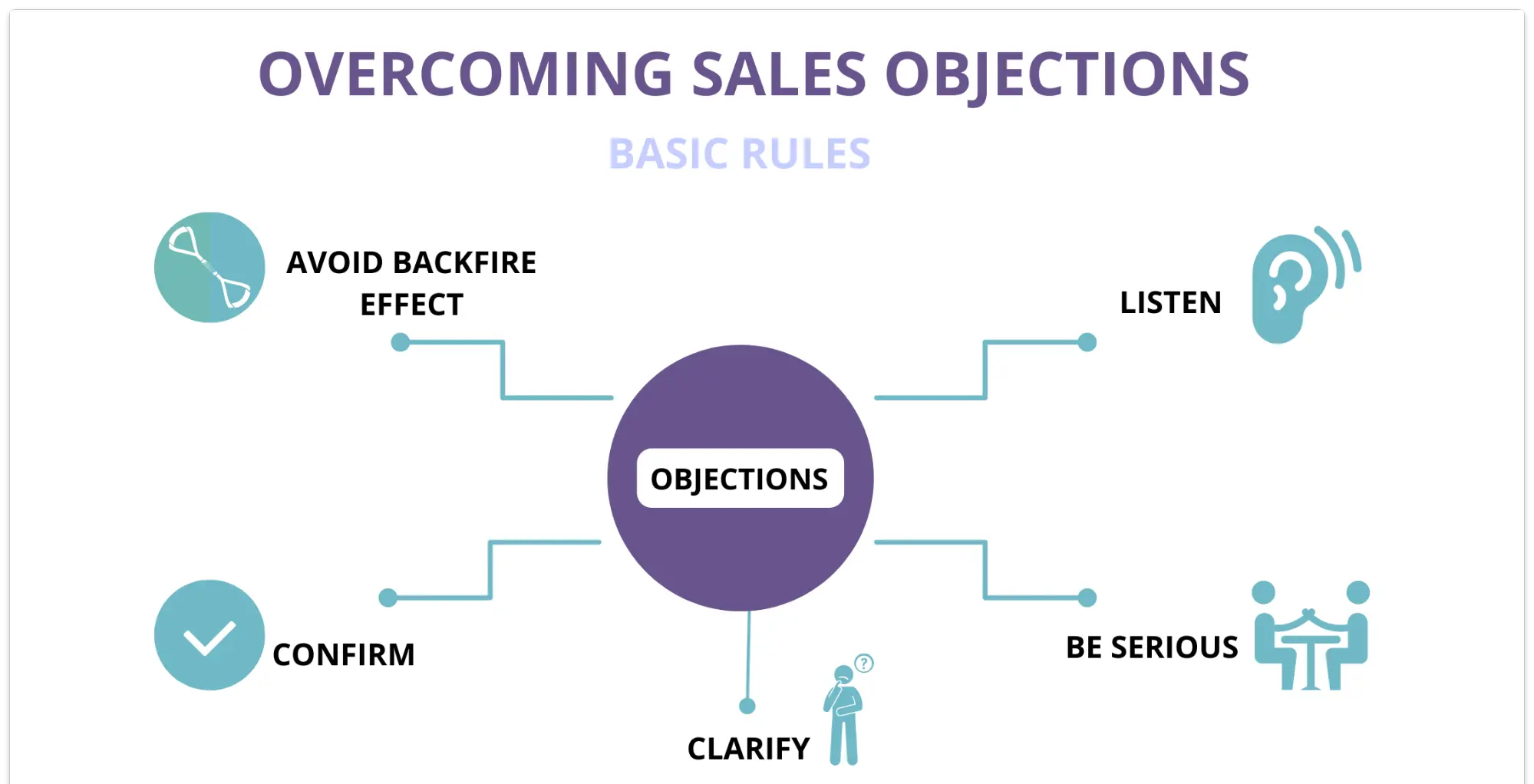Curriculum
Objection Handling Training For Sales People
Objection Handling In Sales
0/17-
Objection Handling Preview
-
The Sales Objection
-
Managing Doubt, Disruption, and Decisions
-
Type of Sales Objections
-
The Skill of Handling Objections
-
Techniques for Handling Objections
-
Ask for What You Want
-
Be Prepared for Sales Objections
-
Diluting Down Objections
-
Objection Handling Examples
-
Handling Buyer Responses
-
Difference Between Objections and Conditions
-
The Sales Skill to Preventing Objections
-
Do's and Don'ts of Handling Objections
-
Scripts and Tips To Resolve Concerns Part 1
-
Scripts and Tips To Resolve Concerns Part 2
-
Resolving Concerns in Large Sales
Objection Handling Preview
What Are Sales Objections?
Objections, also called sales objections, are generally defined as prospect questions or hesitancies about either the product or company. While an objection may sound like a rejection, you should never assume that when a prospect asks a question or expresses a concern that you have failed to generate interest in your product or service. It is true sometimes that your prospect will object when he truly cannot or does not want to buy. Usually, though, objections mask—intentionally or unintentionally—a request for more information. They simply signal your prospect’s level of interest and alert you to what actions need to be taken to bring the sale to a close. If your prospect expresses objections, consider them invitations to continue to sell. Furthermore, leverage these objections into an opportunity to continue to build your relationship with your prospect so that you can continue to create a positive influence on the buyer’s decision.

Think Differently About Objections.
The fact is, objections are an important part of the selling process. But thinking about overcoming objections might be the wrong frame of reference. The word “overcome” implies that you want to conquer, fight, or win (and, therefore, your prospect loses). Instead, it’s best to think about objections as a perfect extension of the selling process. Think back to the steps of the selling process that you have covered so far: prospecting and qualifying, preapproach, approach, and presentation. Throughout each of these steps, your focus is on understanding your prospect’s needs and building a relationship based on trust. The same is true for this step: handling objections. This is all about learning more, finding common ground, and providing the solution that is best for your prospect. Objections and conversation help you better understand exactly what your prospect wants and needs. The bottom line is that you don’t want to avoid objections; you actually want to encourage objections and ask for them.
Since you are constantly selling in your everyday life, you have also undoubtedly encountered objections: your friend doesn’t want to see the same movie as you, your friend doesn’t like the same food as you, etc. When you attempt to convince someone or “sell” him on your point of view, you are not always successful. But each time you “sell” your idea, you usually have additional information or a fallback position so that you can get what you want while meeting the other person’s needs. You are probably more skilled in overcoming objections than you realize.
Occasionally in your sales career, you will encounter a situation in which you are able to close the sale directly after giving your sales presentation. Such a situation, however, is the exception, not the rule. Objections are simply a natural outcome of the sales process. Each potential prospect has his own set of unique needs, and, though you may identify most of them during the preapproach stage of the selling process when you do your research, you will not be able to anticipate all of them. After all, you are not a mind reader. Besides, if all it took to excel in sales was to deliver a perfect script, anyone could do it. But that is not the case. The essence of sales is handling objections and truly understanding how you can help your prospect meet her needs.
It is a demonstration of your skills as a salesperson to find the opportunity in these objections, listen to your prospect, and then respond. So an objection is simply a question from a prospect that indicates that she wants more information. If she weren’t interested, she wouldn’t be asking questions.

Be Prepared for Objections
Your ability to handle and get past objections is where the rubber meets the road in sales. It’ is where the money is truly made. When you ask, you are going to get objections. It’s an unassailable fact, and your brain knows it. This is the reason why you anticipate and brace for rejection. It’s why the mere seconds of silence between the ask and your prospect’s response seem interminable. When you are prepared to handle any objection that comes at you, though, you gain the confidence and courage to wait for your buyer to answer. The objective of this objection handling training course is to prepare you to effectively manage the major types of objections you face throughout the sales process.
A few tips
* Remember WII-FM. WII-FM (What’s In It For Me) is the radio station that everyone listens to. Never lose sight of your prospect’s buying motivations. If time is mission-critical to his success, know what you can deliver and by when. If national reach is important to your prospect, be sure you address it in detail in your proposal.
* Understand risk. Understand what your prospect considers a risk (e.g., time, money, changing suppliers). When risk outweighs reward in the mind of your prospect, chances are she will find a reason not to buy. Understand her risk factors and address them head-on. This will allow you to employ a “risk-removal” strategy rather than a selling strategy.
* Anticipate objections. Think about every possible objection you might get—before you get it. That means making a list of every objection before you even make your presentation and building in the response into the presentation.

Commitment and Sales Objections
Throughout the sales process, you’ll ask stakeholders for next-step commitments. These steps and actions keep your deals moving forward through your sales pipeline. Likewise, they test the strength of your customers engagement. Asking for and getting commitments and consistently getting to the next step accelerates pipeline velocity. Deals with forward momentum have a higher probability of a win and a lower chance of stalling. Commitment objections are rarely harsh and rarely outright rejections. Next steps and the smaller type commitments are usually low-risk actions for your stakeholders. For this reason, the key to getting past these sales objections is showing poise and confidence and helping your prospect see the value in spending more time with you.